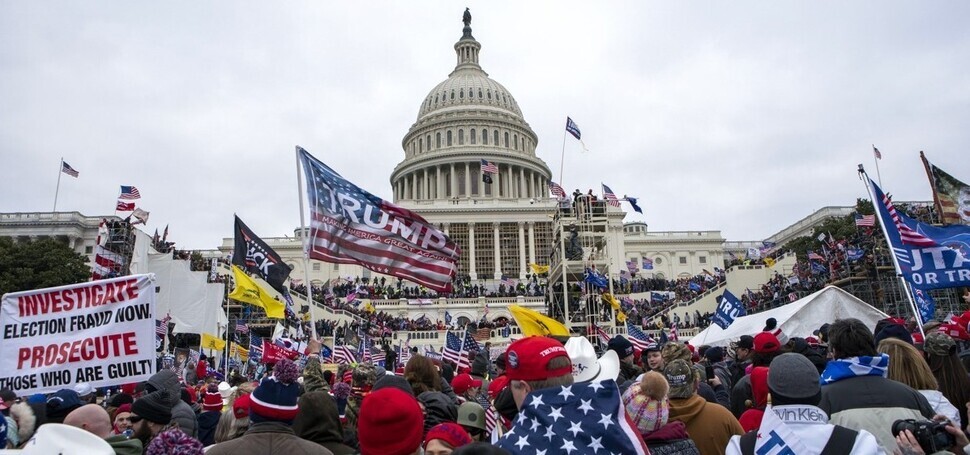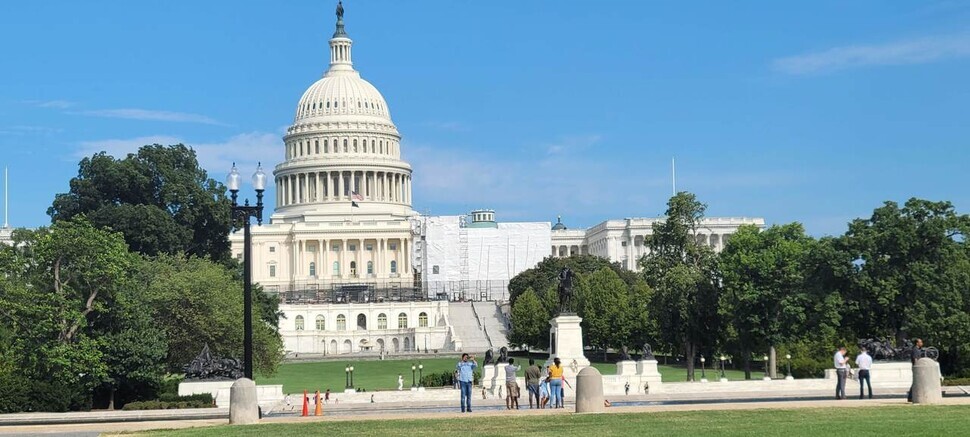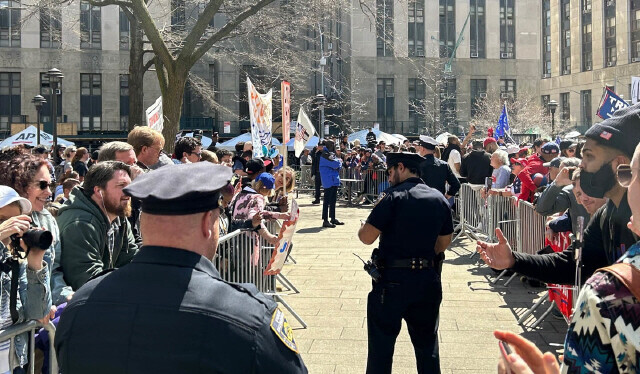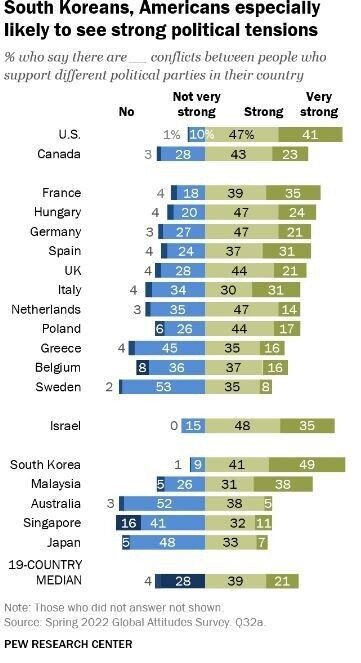hankyoreh
Links to other country sites 다른 나라 사이트 링크
A nation torn in two: Political conflict and inequality turns Americans against Americans

Editor’s note: The leader of South Korea’s main opposition party went on a hunger strike, a motion consenting to his arrest was passed by the National Assembly, which led to a protest by his supporters, and a warrant for his arrest was requested and then subsequently rejected. The intense political confrontation currently unfolding in Korea is not unusual, however. Even in the United States, which has long portrayed itself as a bastion of democracy, the Capitol was overtaken by rioters three years ago, and a former president is now under indictment. We are witnessing the rise of a climate where political opponents are increasingly seen as “enemies.” This crisis of democracy, intertwined with challenges like a struggle for global hegemony, wars, and inflation, is exacerbating public unease. In light of these developments, the Hankyoreh is publishing a series of articles in anticipation of the Asia Future Forum, which will be held on Wednesday, Oct. 11. The pieces in this series will delve into the root causes of these crises and explore potential solutions, in line with the forum’s theme: “The Age of the Polycrisis: A Way to Coexistence.”

At first, Aisha thought it was a joke. She was working from home due to the COVID-19 pandemic when she received a barrage of text messages from her friends. “What in the world is happening there?” they asked. “Are you alright?” Only after seeing the news did she understand what had happened: rioters had torn down the barricade around the Capitol and attacked police officers. Fear gripped her when she heard that lawmakers had hid from the mob. Pictures of a noose hanging from gallows erected in front of the Capitol appalled her.
Aisha’s house is a 15-minute drive away from the building. Friends also living in Washington, DC, asked whether they should evacuate, but Aisha worried that she would find herself in a more dangerous situation by setting foot outside her home. She described the incident that took place on Jan. 6, 2021, as an “insurrection” instead of a “riot.”
On Sept. 6, the day Aisha met with the Hankyoreh in the US capital, former Proud Boys leader Enrique Tarrio was sentenced to 22 years in prison. Having been found guilty of organizing and inciting members of his far-right group to occupy the Capitol, Tarrio received the most severe penalty out of the 1,100 or so people who were indicted for participating in the riot. Founded in New York in 2016, Proud Boys considered themselves foot soldiers of Donald Trump. A few days prior, another member of the group, Dominic Pezzola, shouted as he left the courtroom after being sentenced to 10 years, “Trump won!”
That was the battle cry that erupted across Capitol Hill the day the Capitol building, a symbol of US democracy, was attacked. That day, Trump and his supporters, who stubbornly refused to accept the outcome of the presidential election held two months prior, organized a protest of insubordination, which was eventually tainted with violence. The democratic principle of electing leaders to power was negated. It was one of the most shameful days in the history of the US, a country that had been known as the suzerain of democracy and had exported the system of government abroad.
The summer still lingering, Capitol Hill looked tranquil early this past September. Police officers guarding the Capitol building could be seen here and there, but nobody stopped onlookers from approaching the building and taking pictures. The 2.4-meter black metal fence and barricades that had once surrounded the Capitol building no longer remained, demolished six months after the Jan. 6 riot.
Although two years and nine months have passed since that day, the scar left behind by the incident still divides the US. There are two distinct viewpoints regarding the Jan. 6 attack on the Capitol. The results of a survey conducted by Pew Research Center eight months after the event demonstrate just how polarized the political landscape is in the US. When asked whether rioters were adequately punished, 7 out of 10 Democrats responded that the mob got off lightly. In contrast, 7 out of 10 Republicans said the punishment was excessive or appropriate.
John and Aaron, who live in Fairfax, Virginia, and Milwaukee, Wisconsin, respectively, were also among those who believed the rioters were punished too harshly. They are both Trump supporters. Aaron, who works for an insurance company, believes the penalties could set a dangerous precedent, commenting, “I oppose using the judicial system to drive out political opponents big and small,” adding that Trump’s indictment was also unwarranted.
Trump was indicted in two locations including the state of Georgia in relation to the 2020 presidential election. As a result, his mug shot was taken at Fulton County Jail in Georgia on Aug. 24. Trump was absolutely unaffected politically by the picture of his scowling face. Most Republicans think Trump’s indictment was politically motivated.

A poll conducted by the Wall Street Journal early last month that asked respondents who they would vote for if Trump and Joe Biden competed for the presidency next year showed the two neck and neck, each earning the support of 46% of participants.
As a Democrat who plans to vote for Biden next year, Aisha repeatedly said she was “scared” of Trump running for president again, describing the possibility as an “unfortunate reality.” Unlike her misgivings, while one half of the US is propping up Trump, the other half is supporting Biden with equal strength. Matt, who thinks the 2020 presidential election was rigged, said he would vote for Trump again next year. A resident of a suburb of Chicago, he believes Biden is a puppet being controlled by Obama.
Tony, who teaches political science at the University of Denver in Colorado, never brings up politics with his brother, who believes the 2020 presidential election was stolen. He also believes that the Jan. 6 riot was justified, and that civil war could be warranted if Trump doesn’t win next year’s presidential race. Among his family, Tony — not his brother — is the exception. All from a small town in Montana, a state that borders Canada, the rest of Tony’s family shares similar political views with his brother.
Political polarization has created “political tribes” with stronger internal trust than family. According to a poll conducted by CBS in August, Republicans felt that Trump spoke the truth more than their family, friends, conservative figures and religious leaders.
Political tribes come together and diverge according to region. As author and journalist Bill Bishop wrote in “The Big Sort,” the US is divided into cities and the country, or cities with high-tech industries and locations without. This works to intensify political polarization even more.

While cultural factors caused by the decline of the white working class prompted by industrial and technological changes coupled with globalization are sometimes seen as the source of political polarization, others point to inequality to provide a more fundamental explanation. Jane Mansbridge, professor emerita at the Kennedy School of Government at Harvard University, says market expansion and the failure to tame capitalism weakened community-mindedness, leading to polarization. Elias Crim, the founder of the nonprofit public forum and action collective Solidarity Workshop, said that US democracy is in danger, adding, “Overlying the issue fundamentally is the 20-year-long decline of the US working class, not just cultural aspects like xenophobia and the culture war.” The US middle class has been shrinking ever since the 1980s.
“After the US’ solid middle class broke down and inequality worsened, a kind of hostility was targeted toward ethnic minorities, immigrants, and Muslims, making them prey to an onslaught of antagonism,” said Park Sang-hoon, a visiting researcher at the National Assembly Futures Institute. “The biggest problem world politics is confronted with right now is inequality. Intensifying inequality and the downfall of the middle class is causing a crisis of democracy.”
Political polarization is occurring not just in the US but around the world. South Korea is no exception. A study of 19 democratic countries, most of them developed, conducted by Pew Research Center last year showed that conflict along political lines was most severe in South Korea, followed by the US. Meanwhile, Sweden ranked the lowest in the report. Countries with severe inequality, stronger markets, and relatively weak welfare experienced marked polarization.
Regardless of who wins next year’s US presidential election, the chances of conflict exploding once again aren’t slim. Tony is somewhat pessimistic. He said, “The US still hasn’t gotten over the Jan. 6 attack on the Capitol. The forces set off by Trump still dominate our politics. Many aspects of what happened four years ago will be repeated in next year’s election.”
By Ryu Yi-geun, senior staff writer at the Hankyoreh Economy and Society Research Institute
Please direct questions or comments to [english@hani.co.kr]

Editorial・opinion
![[Editorial] Korea must respond firmly to Japan’s attempt to usurp Line [Editorial] Korea must respond firmly to Japan’s attempt to usurp Line](https://flexible.img.hani.co.kr/flexible/normal/500/300/imgdb/original/2024/0514/2317156736305813.jpg) [Editorial] Korea must respond firmly to Japan’s attempt to usurp Line
[Editorial] Korea must respond firmly to Japan’s attempt to usurp Line![[Editorial] Transfers of prosecutors investigating Korea’s first lady send chilling message [Editorial] Transfers of prosecutors investigating Korea’s first lady send chilling message](https://flexible.img.hani.co.kr/flexible/normal/500/300/imgdb/original/2024/0514/7917156741888668.jpg) [Editorial] Transfers of prosecutors investigating Korea’s first lady send chilling message
[Editorial] Transfers of prosecutors investigating Korea’s first lady send chilling message- [Column] Will Seoul’s ties with Moscow really recover on their own?
- [Column] Samsung’s ‘lost decade’ and Lee Jae-yong’s mismatched chopsticks
- [Correspondent’s column] The real reason the US is worried about Chinese ‘overcapacity’
- [Editorial] Yoon’s gesture at communication only highlights his reluctance to change
- [Editorial] Perilous stakes of Trump’s rhetoric around US troop pullout from Korea
- [Guest essay] Preventing Korean Peninsula from becoming front line of new cold war
- [Column] The state is back — but is it in business?
- [Column] Life on our Trisolaris
Most viewed articles
- 1Ado over Line stokes anti-Japanese sentiment in Korea, discontent among Naver employees
- 2[Column] Samsung’s ‘lost decade’ and Lee Jae-yong’s mismatched chopsticks
- 3Korean opposition decries Line affair as price of Yoon’s ‘degrading’ diplomacy toward Japan
- 4US has always pulled troops from Korea unilaterally — is Yoon prepared for it to happen again?
- 5Korean auto industry on edge after US hints at ban on Chinese tech in connected cars
- 6[Editorial] Yoon’s gesture at communication only highlights his reluctance to change
- 7[Correspondent’s column] The real reason the US is worried about Chinese ‘overcapacity’
- 8[Column] Will Seoul’s ties with Moscow really recover on their own?
- 9[Photo] Korean students protest US complicity in Israel’s war outside US Embassy
- 101 in 3 S. Korean security experts support nuclear armament, CSIS finds